Did you know that the sports broadcasting industry is expected to reach a significant market size of $55.14 billion by 2030? This growing sector offers numerous career opportunities for individuals who dream of becoming professional sports broadcasters and combining their love for sports with their passion for broadcasting.
To succeed in this exciting field, aspiring sports broadcasters need to develop essential skills and obtain a graduate degree in sports communication or media. A high-quality sports journalism graduate program can provide the theoretical knowledge, technical skills, and professional network necessary for a successful career in sports broadcasting.
Key Takeaways:
- The sports broadcasting industry is projected to reach a market size of 55.14 billion USD by 2030.
- Aspiring sports broadcasters should consider obtaining a graduate degree in sports communication or media.
- A high-quality sports journalism program can provide the necessary skills and network for success in sports broadcasting.
How to Become a Sports Broadcaster
Becoming a sports broadcaster requires more than just a passion for the game. To thrive in this field, individuals need to develop a strong educational background, soft skills, technical abilities, and a professional network. Obtaining a graduate degree in sports communication or media can provide the necessary foundation and open up opportunities for success in sports broadcasting.
While a graduate degree is not always a requirement for entry-level positions, it can significantly enhance your credibility and marketability in this competitive industry. A sports communication or media program goes beyond the fundamentals of broadcasting and delves into the intricacies of sports journalism, multimedia production, public relations, and sports marketing.
These graduate programs often offer hands-on training, internships, and opportunities to work with seasoned professionals in the field. They can equip aspiring sports broadcasters with the skills and knowledge necessary to excel in live broadcasts, play-by-play commentary, studio shows, and digital media platforms.
“Entering the world of sports broadcasting requires a combination of talent, education, and real-world experience. Obtaining a graduate degree in sports communication not only demonstrates your commitment to the field but also exposes you to industry-specific courses and internships that can propel your career forward.”
In addition to formal education, honing soft skills is crucial for sports broadcasters. Effective communication, storytelling, improvisation, and adaptability are essential to engaging and entertaining audiences. Being well-versed in current sports trends, statistics, and historical context can also enhance your credibility as a sports broadcaster.
Technical abilities are equally important. Familiarity with broadcasting equipment, audio and video editing software, and live production tools are essential for producing high-quality sports broadcasts. Additionally, learning to navigate social media platforms, streaming services, and other digital tools can expand your reach and connect with fans.
Building a strong professional network is invaluable in the sports broadcasting industry. Attend industry events, conferences, and join relevant professional organizations to establish connections with executives, producers, and fellow broadcasters. Networking can lead to mentorship opportunities, job referrals, and collaborations that can accelerate your career growth.
By combining a solid educational foundation, strong soft skills, technical expertise, and a robust professional network, individuals can increase their chances of breaking into the competitive world of sports broadcasting and pursuing a successful career in this exciting field.

Tips to Become a Sports Broadcaster:
- Enroll in a graduate degree program in sports communication or media to gain comprehensive knowledge and practical experience.
- Develop effective communication and storytelling skills to engage and entertain viewers.
- Gain technical expertise in broadcasting equipment, audio and video editing software, and live production tools.
- Stay up-to-date with current sports trends, statistics, and historical context.
- Network with professionals in the industry by attending events, conferences, and joining professional organizations.
What to Look for in a Sports Broadcasting Degree Program
When aspiring sports broadcasters are researching graduate programs, it’s important to remember that not all sports broadcasting degree programs are created equal. To ensure a rewarding educational experience and future career prospects, there are several key factors to consider:
- Track Record of Successful Graduates: A reputable sports broadcasting program will have a track record of producing successful graduates who have gone on to work in notable media organizations. Research alumni achievements and career paths to gauge the program’s effectiveness in preparing students for professional success.
- Sports Broadcasting Internships in Major Media Markets: Internship opportunities provide invaluable hands-on experience and networking opportunities. Look for programs that have established connections with major media markets, sports networks, and professional sports teams to increase your chances of securing internships in coveted locations.
- Quality of Facilities and Equipment: State-of-the-art facilities and equipment are essential for practical training in sports broadcasting. Look for programs that offer access to professional-grade studios, editing suites, and broadcasting technologies. These resources will enable you to gain hands-on experience with industry-standard equipment.
Considering these factors will help aspiring sports broadcasters make informed decisions when choosing a sports broadcasting degree program that aligns with their career goals and maximizes their potential for success in the industry.
Speaking of the importance of practical training, take a moment to explore this image that illustrates the hands-on experience gained in sports broadcasting degree programs:
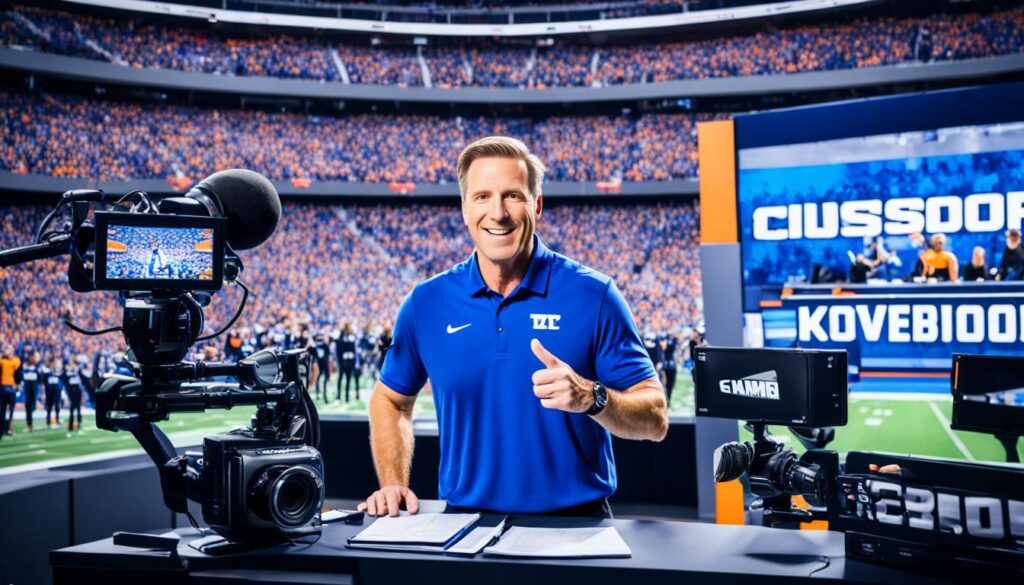
Continue reading to discover Sacred Heart University’s Master of Arts in Sports Communication & Media program, which provides students with the ideal platform to launch their careers in sports broadcasting and related fields.
Start Your Career in Sports Communication & Media at SHU
If you’re passionate about sports and aspiring to embark on a successful career in sports communication and media, look no further than Sacred Heart University (SHU). With its Master of Arts in Sports Communication & Media program, SHU equips aspiring sports broadcasters with the necessary skills and industry knowledge to thrive in the competitive world of sports media.
The program at SHU offers two specialized tracks that cater to different aspects of the sports communication industry: sports broadcasting and athletic communications & production. Students can choose the track that aligns with their interests and career goals, ensuring a tailored educational experience.
One of the highlights of SHU’s program is the emphasis on hands-on experience. Students have the opportunity to work with professionals in industry-standard facilities and boast access to state-of-the-art equipment. This practical exposure enables students to develop essential skills and gain valuable insights into the sports communication and media field.
Furthermore, SHU recognizes the importance of building a strong professional network. Through its program, students have the chance to engage with industry experts, alumni, and fellow students, establishing connections that can open doors to exciting career opportunities.
Why Choose SHU’s Sports Communication & Media Program?
“Sacred Heart University’s Sports Communication & Media program provided me with the knowledge, skills, and connections necessary to launch my career in sports broadcasting. The hands-on experience, coupled with the guidance of industry professionals, truly sets SHU apart. I am grateful for the invaluable education and opportunities I received during my time at SHU.”
| Program Highlights | Sports Broadcasting Track | Athletic Communications & Production Track |
|---|---|---|
| Hands-on Experience |
|
|
| Professional Network |
|
|
| State-of-the-Art Facilities | Access to industry-standard equipment, studios, and production facilities | |
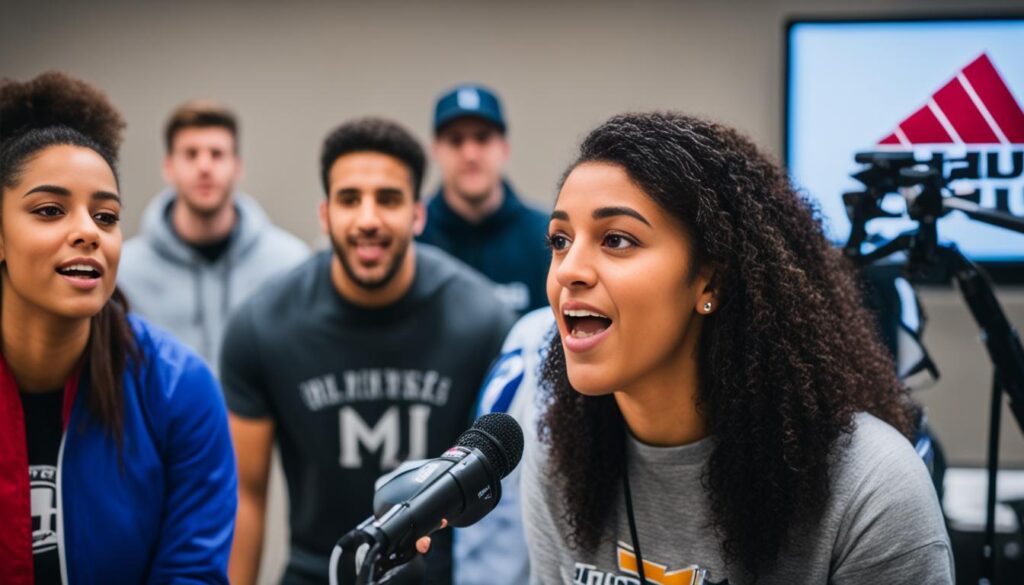
Enrolling in SHU’s Sports Communication & Media program is a significant step towards kickstarting your career in the exciting field of sports broadcasting. The comprehensive curriculum, hands-on experience, and strong industry connections provided by SHU will position you for success in this competitive industry.
Sports Broadcasting Course – Learn the Skills Needed
For individuals looking for a shorter, more focused option to kickstart their sports broadcasting career, there are sports broadcasting courses available. These courses offer a condensed timeline, usually around eight weeks, and provide valuable skills, mentorship, and ongoing career advice. By enrolling in a sports broadcasting course, aspiring sports broadcasters can enhance their on-air style, improve their personal brand, and gain industry insights.
These courses are designed to equip students with the essential skills needed to excel in the competitive world of sports broadcasting. From developing effective storytelling techniques to mastering on-camera presence, students will learn the ins and outs of sports broadcasting from industry professionals with years of experience.
One of the key benefits of taking a sports broadcasting course is the opportunity for mentorship. Students will have the chance to receive personalized feedback and guidance from instructors who have worked in the industry. This mentorship can provide invaluable insights and help students refine their skills and develop a strong professional network.
Throughout the course, students can expect to cover a wide range of topics, including sports journalism, game analysis, interview techniques, and broadcasting ethics. They will also gain hands-on experience by participating in mock broadcasts and engaging in practical exercises. Additionally, students will learn about the latest trends and technologies shaping the sports broadcasting industry.
Upon completion of the course, students will have the necessary knowledge and skills to confidently pursue a career in sports broadcasting. They will be equipped with a strong portfolio and the ability to showcase their talent in the industry. With the help of their instructors and classmates, students can also establish connections that may lead to internships or job opportunities.
If you’re passionate about sports and have always dreamed of having a career in broadcasting, a sports broadcasting course can provide the foundation and skills you need to make that dream a reality. With the right education and training, you can position yourself for success in this exciting field.

Why Pursue a Career in Sports Broadcasting?
Sports broadcasting offers a multitude of exciting career opportunities, making it an appealing choice for individuals passionate about sports and broadcasting. In the digital age, where traditional media channels are declining, sports broadcasting on TV, radio, and online platforms continues to thrive and remains in high demand.
The sports broadcasting industry is projected to reach a staggering size of 55.14 billion USD by 2030, indicating significant growth potential and promising job prospects for aspiring sports broadcasters. This growth is fueled by the enduring popularity of sports and the increasing consumption of sports content across various media platforms.
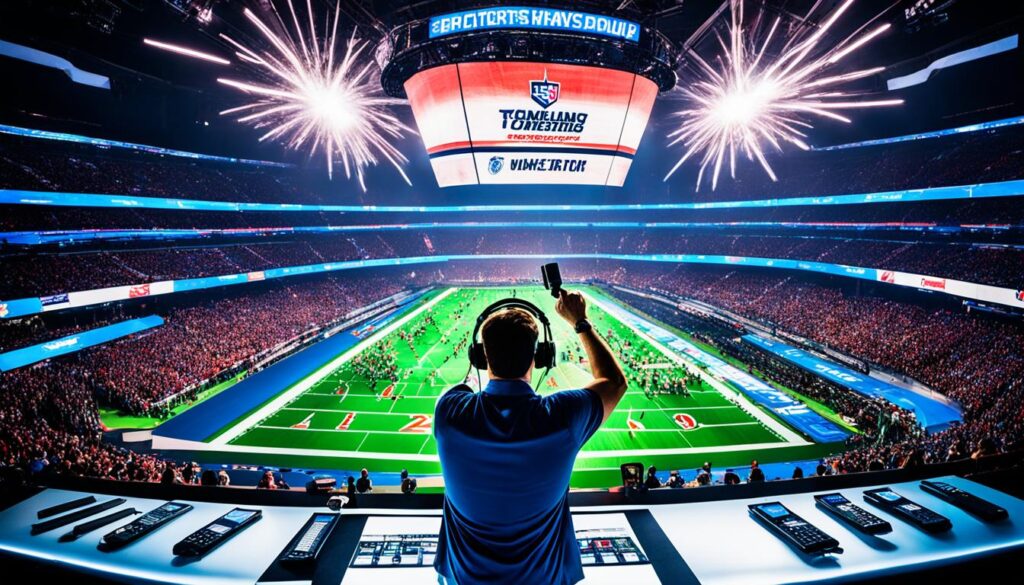
As a sports broadcaster, you’ll have the opportunity to engage with a vast audience, bringing the thrill of live sports events to fans around the world. Your voice, commentary, and analysis can shape tens of thousands of viewers’ experiences and evoke emotions during memorable sporting moments.
Whether you prefer the fast-paced nature of live TV broadcasts, the intimate connection of radio commentary, or the interactive engagement of online streaming, sports broadcasting offers diverse avenues to showcase your talent and passion.
“Sports broadcasting presents a unique blend of sports and storytelling where the broadcasters become the voice of the game, delivering excitement, analysis, and emotion to fans. It’s an exhilarating profession that allows you to be at the heart of the action and connect with fans on a deeply personal level.” – John Davis, Sports Broadcaster
By pursuing a career in sports broadcasting, you’ll have the opportunity to work alongside renowned athletes, coaches, and industry professionals. This collaborative environment provides a platform for networking, learning, and growing your professional connections within the sports industry.
Advantages of a Career in Sports Broadcasting
- Opportunity to cover prestigious sporting events, including the Super Bowl, NBA Finals, World Cup, and Olympics.
- Ability to build a personal brand and gain recognition for your expertise and unique broadcasting style.
- Potential for travel, visiting different sports venues and cities around the world.
- Continuous learning and growth, staying up-to-date with the latest sports trends, technologies, and storytelling techniques.
- Possibility of diversifying your career path within the sports industry, such as hosting shows, producing content, or becoming a sports commentator.
Embarking on a career in sports broadcasting opens doors to a dynamic, fulfilling profession that combines your love for sports with the power of media and communication. It’s a chance to transform your passion into a rewarding lifelong journey.
Best Practices in Digital Sports Marketing
In the fast-paced world of sports marketing, organizations need to stay ahead of the curve by adapting to new trends and leveraging innovative technologies to connect with fans and stand out from the competition. By implementing best practices, sports marketers can create impactful campaigns that resonate with their target audience and drive engagement. Here are some key strategies in digital sports marketing:
1. Personalized Marketing Strategies
Personalization is a powerful tool in sports marketing. By tailoring individualized experiences and delivering relevant content, organizations can create deeper connections with fans. Collecting and analyzing fan data allows sports marketers to segment their audience and create personalized campaigns that speak directly to their interests and preferences. This targeted approach not only enhances fan engagement but also increases the likelihood of conversion and long-term loyalty.
2. Engaging Content Creation
Engaging content is at the heart of successful sports marketing. Brands need to create compelling and shareable content that captivates fans’ attention. This can include interactive videos, behind-the-scenes footage, exclusive interviews, and user-generated content. By providing valuable and entertaining content, sports marketers can foster a sense of community and build a loyal fan base.
3. Mobile Optimization
In today’s digital landscape, mobile optimization is critical for sports marketers. With a significant portion of fans accessing content through their mobile devices, it is essential to ensure that websites, apps, and campaigns are mobile-friendly. Responsive design, fast loading times, and intuitive navigation are key to maximizing the mobile experience and keeping fans engaged.
4. Social Media Marketing
Social media has revolutionized the way sports marketers connect with fans. Platforms like Facebook, Instagram, Twitter, and YouTube provide valuable channels for engaging with fans, sharing content, and building brand awareness. Sports marketers should develop a strong social media strategy that includes regular updates, real-time engagement, influencer partnerships, and targeted advertising. Social media is also an excellent platform for customer feedback and relationship building.
5. Video Marketing
Video content has become increasingly popular in sports marketing. Whether it’s game highlights, player interviews, or promotional videos, the power of visual storytelling cannot be overlooked. Sports marketers should incorporate video into their content strategy, leveraging platforms like YouTube and live streaming services to reach a wider audience and create memorable experiences.
6. Adoption of Innovative Technologies
The sports industry is constantly evolving, and sports marketers need to embrace innovative technologies to stay competitive. Gamification, augmented reality (AR), virtual reality (VR), and interactive experiences offer exciting opportunities to engage fans in new and immersive ways. By incorporating these technologies into campaigns and activations, sports marketers can leave a lasting impression on fans and differentiate themselves in the market.
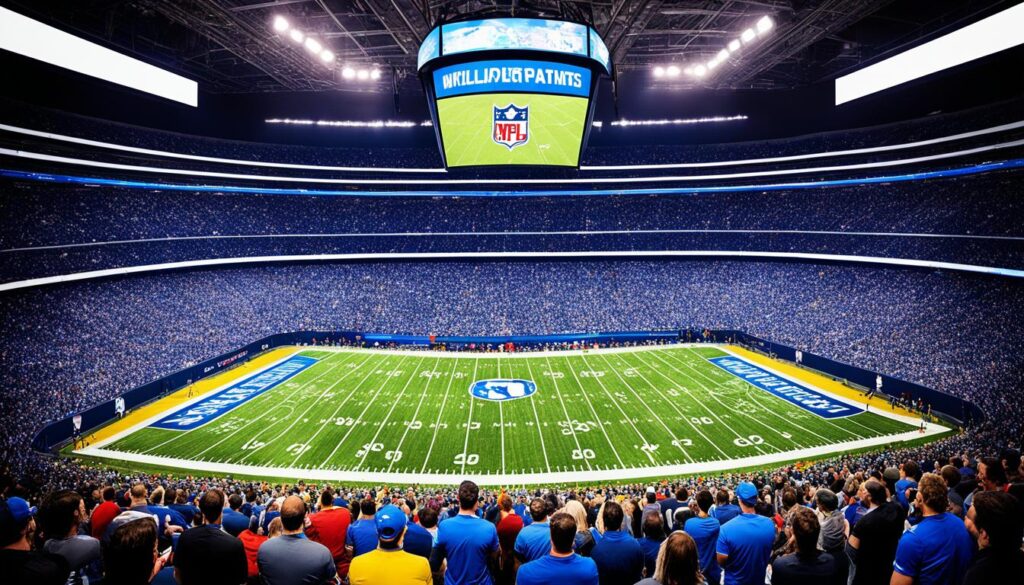
Incorporating these best practices into digital sports marketing strategies can help organizations effectively reach their target audience, boost fan engagement, and drive business results. By staying at the forefront of industry trends and leveraging the power of personalized marketing, engaging content, mobile optimization, social media, video, and innovative technologies, sports marketers can create impactful campaigns that resonate with fans in today’s digital landscape.
Personalization and Fan Engagement in Sports Marketing
In today’s competitive sports marketing landscape, personalization has become a vital strategy for driving fan engagement and fostering meaningful connections between teams, athletes, and their supporters. By understanding fan preferences and tailoring marketing efforts accordingly, organizations can create immersive experiences, deliver relevant content, and strengthen brand loyalty.
One of the most powerful tools in achieving successful personalization is leveraging fan insights. By collecting and analyzing data on fan demographics, behaviors, and preferences, sports marketers can gain valuable insights into their target audience. These insights allow organizations to segment their fan base and create personalized marketing campaigns that resonate with individual fans on a deeper level.
Through targeted campaigns, teams and brands can deliver tailored content that aligns with fans’ interests and motivations. Whether it’s personalized email newsletters, social media posts, or exclusive offers, providing fans with content that speaks directly to their passions and desires enhances their engagement and fosters a sense of belonging.
For example, a soccer team could use fan data to identify supporters who are avid followers of a particular player. They could then create targeted campaigns featuring exclusive content, such as behind-the-scenes interviews or signed merchandise from that player. This personalized approach makes fans feel valued and appreciated, strengthening their emotional connection to the team.
“Personalization allows us to go beyond simply selling products or promoting events. It enables us to build relationships with our fans on an individual level, turning them into loyal advocates for our brand,” says Mark Johnson, Marketing Director of Sports Unlimited.
Benefits of Personalization in Sports Marketing
The benefits of personalization in sports marketing are vast and impactful. Not only does it drive fan engagement, but it also strengthens brand loyalty and increases revenue potential. By personalizing their marketing efforts, organizations can:
- Enhance the fan experience by delivering relevant content and offers
- Deepen the emotional connection between fans and teams/athletes
- Build long-lasting relationships and foster brand loyalty
- Increase fan retention and reduce churn
- Maximize revenue through targeted promotions and upselling
Personalization also allows for continuous improvement and optimization. By tracking fan engagement metrics and analyzing the performance of personalized campaigns, sports marketers can refine their strategies and deliver even more impactful experiences.

Case Study: Fan Personalization in the NBA
“The NBA has embraced personalization as a core component of its marketing strategy. It leverages fan data to deliver personalized communications, tailored content, and exclusive offers to its millions of fans worldwide,”
In recent years, the NBA has utilized fan data to drive personalized marketing campaigns and elevate fan engagement. By leveraging fan insights, they have been able to provide tailored content and experiences that resonate with individual fans.
For example, NBA teams use fan data to create targeted ticket offers based on fans’ preferred teams, players, and seating preferences. This level of personalization makes fans feel seen and understood, leading to increased ticket sales and higher attendance rates.
Furthermore, the NBA has successfully implemented fan personalization through their mobile app. The app curates content based on fans’ favorite teams, players, and game preferences. This personalized approach keeps fans engaged and connected with the NBA even when they are not attending games or watching on television.
Overall, personalization has played a significant role in increasing fan engagement and driving revenue growth within the NBA. By delivering tailored experiences and content, the league has successfully cultivated a loyal fan base that is deeply connected to the sport and its athletes.
Engaging Content Strategies in Sports Marketing
Engaging content plays a crucial role in modern sports marketing. To capture fans’ attention and encourage participation, organizations must create compelling storytelling that resonates with their audience. Whether it’s user-generated content or interactive experiences, the key is to foster a sense of community and strengthen brand affinity.
One effective way to engage fans is through user-generated content. This can include fan-generated videos, photos, or social media posts that showcase their passion for the sport and their favorite teams. Encouraging fans to share their own experiences and stories not only creates a sense of involvement but also helps build an authentic connection between the brand and its supporters.
By leveraging fan-generated content, sports marketers can tap into the passion and creativity of their audience, creating a powerful bond that extends beyond traditional marketing efforts.
Interactive elements such as quizzes and polls also provide an opportunity for fans to actively participate and engage with a brand. By incorporating these features into marketing campaigns, organizations can create a sense of excitement and competition, driving fan involvement and interaction.
Personalized Experiences
Another strategy to enhance engagement is by providing personalized experiences to fans. Sports marketers can leverage data analytics and fan insights to tailor content based on individual preferences. By delivering customized content, such as personalized emails, exclusive offers, or targeted recommendations, organizations can create a more immersive and relevant experience for their audience.
Compelling Storytelling
Compelling storytelling is at the heart of engaging content in sports marketing. By using narratives that captivate and inspire, brands can create an emotional connection with fans. Whether it’s sharing inspiring stories of athletes overcoming challenges or showcasing the behind-the-scenes moments of a team, effective storytelling can evoke strong emotions and foster a deeper connection between the brand and its audience.
Furthermore, incorporating visual elements such as captivating images and videos can enhance the storytelling experience. These visual assets can be used across various platforms, including websites, social media, and digital advertisements, to create a visually appealing and immersive experience for fans.
Community Building
Building a sense of community is essential in sports marketing. By creating spaces for fans to connect and interact with each other, organizations can foster a fan community that becomes an integral part of the brand’s identity. This can be achieved through online forums, fan clubs, or dedicated social media groups where fans can share their passion, discuss the latest games, and support their favorite teams.
| Benefits of Engaging Content Strategies in Sports Marketing | Examples |
|---|---|
| Increased fan engagement and interaction | Encouraging fans to participate in live polls during games |
| Strengthened brand affinity and loyalty | Showcasing fan-generated content on social media |
| Enhanced personalization and tailored experiences | Sending personalized emails with exclusive offers |
| Building a passionate and dedicated fan community | Creating online forums for fans to connect and discuss |
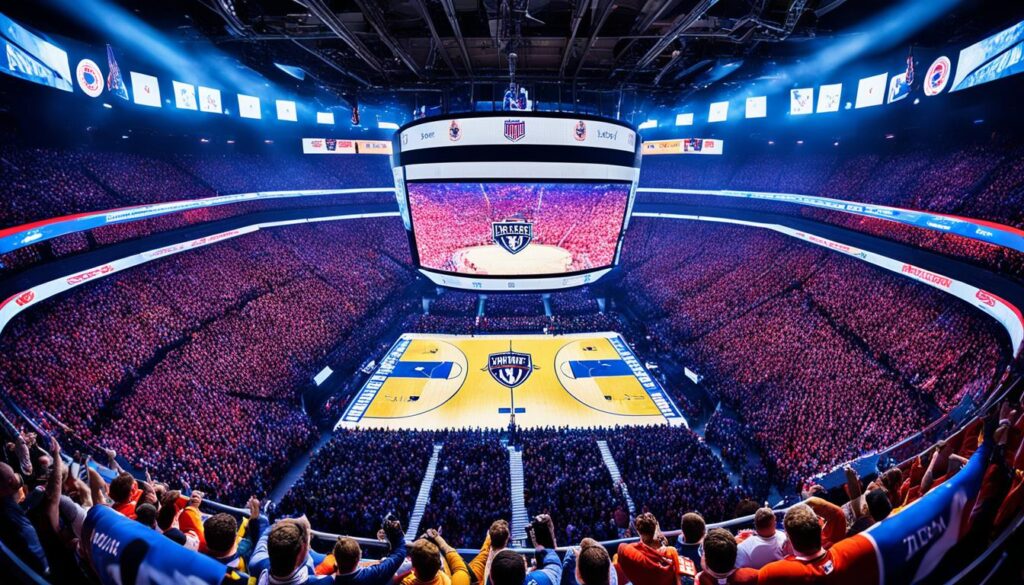
Conclusion
The sports broadcasting industry offers exciting career opportunities for individuals passionate about sports and broadcasting. With the right education, skills, and industry knowledge, aspiring sports broadcasters can thrive in this dynamic field. By staying informed about industry trends, adopting digital marketing strategies, and embracing new technologies, sports broadcasters can pave their way to success in the marketplace.
As the sports broadcasting industry continues to grow, so does the demand for skilled professionals who can provide engaging content and connect with fans on various platforms. With advancements in technology, sports broadcasters should embrace digital marketing strategies, such as personalized marketing and fan engagement techniques, to establish a strong connection with their audience.
To stay ahead in the sports broadcasting industry, it is crucial for professionals to continuously educate themselves about industry trends and adapt to the changing landscape. The integration of digital platforms, social media, and innovative technologies will play a significant role in shaping the future of sports broadcasting. By harnessing these tools and leveraging their expertise, sports broadcasters can thrive and succeed in this competitive industry.









